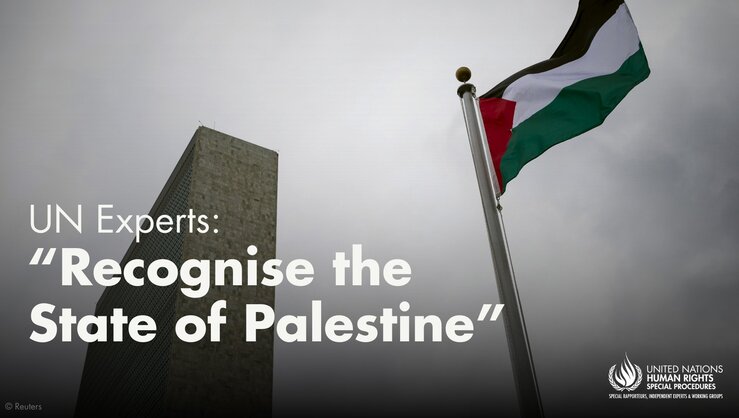UN Experts Urge All States to Recognise State of Palestine
As of 28 May 2024, the State of Palestine was recognised by the vast majority of Member States of the United Nations.
All States must follow the example of 146 United Nations Member States and recognise the State of Palestine and use all political and diplomatic resources at their disposal to bring about an immediate ceasefire in Gaza, UN experts said on June 3.
“This recognition is an important acknowledgement of the rights of the Palestinian people and their struggles and suffering towards freedom and independence,” the experts said.
They insisted that Palestine must be able to enjoy full self-determination, including the ability to exist, determine their destiny and develop freely as a people with safety and security.
“This is a precondition for lasting peace in Palestine and the entire Middle East – beginning with the immediate declaration of a ceasefire in Gaza and no further military incursions into Rafah,” the experts said.
The State of Palestine, formally declared by the Palestine Liberation Organization (PLO) on 15 November 1988, claims sovereignty over the remaining parts of historic Palestine that Israel occupied in 1967: the West Bank, including East Jerusalem, and the Gaza Strip.
As of 28 May 2024, the State of Palestine was recognised by the vast majority of Member States of the United Nations.
The experts welcomed the latest recognition of the occupied Palestinian territory as a State by Norway, Ireland and Spain, which comes after the General Assembly overwhelmingly voted – with 143 votes in favour to nine votes against – to back Palestine’s bid to become a full member of the United Nations on 10 May 2024.
“Even though the prospect of lasting peace and an end to occupation has remained elusive since the Oslo Accords more than 30 years ago, a political solution should not be considered foregone,” the experts said. “A two-State solution remains the only internationally agreed path to peace and security for both Palestine and Israel and a way out of generational cycles of violence and resentment.”
The UN experts said the move by the Prosecutor of the International Criminal Court (ICC) to seek arrest warrants against the Israeli Prime Minister, Minister of Defense and top Hamas leaders on suspicions of war crimes and crimes against humanity was a promise of accountability and an end to impunity in the occupied Palestinian territory.
“The International Court of Justice (ICJ) in its most recent ruling on provisional measures, ordering Israel to stop its military operations in Rafah, immediately reopen the Rafah crossing to allow life-saving humanitarian aid into the Gaza strip and grant unimpeded access for UN human rights mechanisms, complements the work of the ICC in ensuring full justice in Palestine and preventing any further bloodshed in Gaza,” the experts said.
“States must refrain from threats and attacks against the ICC and the ICJ,” they said. “These courts must operate without foreign interference and threats, to uphold the promise of global justice and individual accountability for all victims of the conflict.”
Courtesy: UN Human Rights Office












